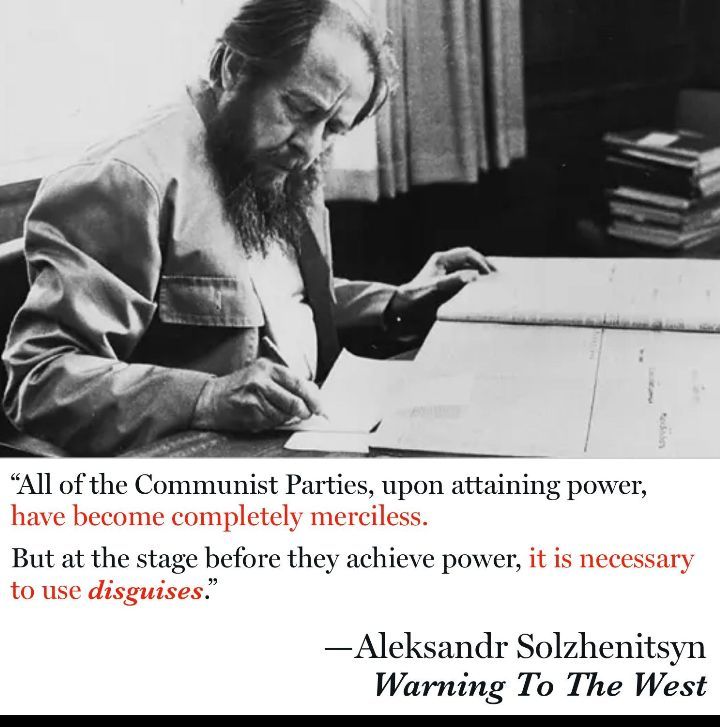Rod Dreher.
“It’s possible to miss the onslaught of totalitarianism, precisely because we have a misunderstanding of how its power works. In 1951, poet and literary critic Czesław Miłosz, exiled to the West from his native Poland as an anti-communist dissident, wrote that Western people misunderstand the nature of communism because they think of it only in terms of “might and coercion.” “That is wrong,” he wrote. “There is an internal longing for harmony and happiness that lies deeper than ordinary fear or the desire to escape misery or physical destruction.”
In The Captive Mind, Miłosz said that communist ideology filled a void that had opened in the lives of early-twentieth-century intellectuals, most of whom had ceased to believe in religion. Today’s left-wing totalitarianism once again appeals to an internal hunger, specifically the hunger for a just society, one that vindicates and liberates the historical victims of oppression. It masquerades as kindness, demonizing dissenters and disfavored demographic groups to protect the feelings of “victims” in order to bring about “social justice.”
The contemporary cult of social justice identifies members of certain social groups as victimizers, as scapegoats, and calls for their suppression as a matter of righteousness. In this way, the so-called social justice warriors (aka SJWs), who started out as liberals animated by an urgent compassion, end by abandoning authentic liberalism and embracing an aggressive and punitive politics that resembles Bolshevism, as the Soviet style of communism was first called.
At the turn of the twenty-first century, the cultural critic René Girard prophetically warned: “The current process of spiritual demagoguery and rhetorical overkill has transformed the concern for victims into a totalitarian command and a permanent inquisition.” This is what the survivors of communism are saying to us: liberalism’s admirable care for the weak and marginalized is fast turning into a monstrous ideology that, if it is not stopped, will transform liberal democracy into a softer, therapeutic form of totalitarianism
“Communist ontology”
…Back in the Soviet era, totalitarianism demanded love for the Party, and compliance with the Party’s demands was enforced by the state. Today’s totalitarianism demands allegiance to a set of progressive beliefs, many of which are incompatible with logic—and certainly with Christianity. Compliance is forced less by the state than by elites who form public opinion, and by private corporations that, thanks to technology, control our lives far more than we would like to admit. Many conservatives today fail to grasp the gravity of this threat, dismissing it as mere “political correctness”—a previous generation’s disparaging term for so-called “wokeness.” It’s easy to dismiss people like the former Soviet professor as hysterical if you think of what’s happening today as nothing more than the return of the left-wing campus kookiness of the 1990s. Back then, the standard conservative response was dismissive. Wait till those kids get out into the real world and have to find a job.
Well, they did—and they brought the campus to corporate America, to the legal and medical professions, to media, to elementary and secondary schools, and to other institutions of American life. In this cultural revolution, which intensified in the spring and summer of 2020, they are attempting to turn the entire country into a “woke” college campus. Today in our societies, dissenters from the woke party line find their businesses, careers, and reputations destroyed. They are pushed out of the public square, stigmatized, canceled, and demonized as racists, sexists, homophobes, and the like. And they are afraid to resist, because they are confident that no one will join them or defend them…

Soft totalitarianism exploits decadent modern man’s preference for personal pleasure over principles, including political liberties. The public will support, or at least not oppose, the coming soft totalitarianism, not because it fears the imposition of cruel punishments but because it will be more or less satisfied by hedonistic comforts. Nineteen Eighty-Four is not the novel that previews what’s coming; it’s rather Aldous Huxley’s Brave New World. The contemporary social critic James Poulos calls this the “Pink Police State”: an informal arrangement in which people will surrender political rights in exchange for guarantees of personal pleasure…
Surveillance Technology
Soft totalitarianism, as we will see in a later chapter, makes use of advanced surveillance technology not (yet) imposed by the state, but rather welcomed by consumers as aids to lifestyle convenience—and in the postpandemic environment, likely needed for public health. It is hard to get worked up over Big Brother when you have already grown accustomed to Big Data closely monitoring your private life via apps, credit cards, and smart devices, which make life so much easier and more pleasurable. In Orwell’s fictional dystopia, the state installed “telescreens” in private homes to keep track of individual’s lives. Today we install smart speakers into our homes to increase our sense of well-being. How did maximizing a feeling of well-being become the ultimate goal of modern people and societies? …
Christian resistance on a large scale to the anti-culture has been fruitless, and is likely to be for the foreseeable future. Why? Because the spirit of the therapeutic has conquered the churches as well—even those populated by Christians who identify as conservative. Relatively few contemporary Christians are prepared to suffer for the faith, because the therapeutic society that has formed them denies the purpose of suffering in the first place, and the idea of bearing pain for the sake of truth seems ridiculous.
It is difficult for people raised in the free world to grasp the breadth and the depth of lying required simply to exist under communism. All the lies, and lies about lies, that formed the communist order were built on the basis of this foundational lie: the communist state is the sole source of truth.
Orwell said in Nineteen Eighty-Four:
“The Party told you to reject the evidence of your eyes and ears. It was their final, most essential command.”
— Rod Dreher, Live Not By Lies
Aleksandr Solzhenitsyn famously said that one of the biggest mistakes people make is assuming totalitarianism can’t happen in their country. Many American Christians are making that mistake today, sleepwalking through the erosion of our freedoms. Live Not by Lies will wake them and equip them for the long resistance.
——

The New York Times best-selling author of The Benedict Option draws on the wisdom of Christian survivors of Soviet persecution to warn American Christians of approaching dangers.
For years, émigrés from the former Soviet bloc have been telling Rod Dreher they see telltale signs of “soft” totalitarianism cropping up in America – something more Brave New World than Nineteen Eighty-Four. Identity politics are beginning to encroach on every aspect of life. Civil liberties are increasingly seen as a threat to “safety”. Progressives marginalize conservative, traditional Christians and other dissenters. Technology and consumerism hasten the possibility of a corporate surveillance state. And the pandemic, having put millions out of work, leaves our country especially vulnerable to demagogic manipulation.
In Live Not by Lies, Dreher amplifies the alarm sounded by the brave men and women who fought totalitarianism. He explains how the totalitarianism facing us today is based less on overt violence and more on psychological manipulation. He tells the stories of modern-day dissidents – clergy, laity, martyrs, and confessors from the Soviet Union and the captive nations of Europe – who offer practical advice for how to identify and resist totalitarianism in our time. Following the model offered by a prophetic World War II-era pastor who prepared believers in his Eastern European to endure the coming of communism, Live Not by Lies teaches American Christians a method for resistance:
See: Acknowledge the reality of the situation.
Judge: Assess reality in the light of what we as Christians know to be true.
Act: Take action to protect truth.+
+
1930’s: Fr. Henry Davis: “It is sinful to vote for the enemies of religion or liberty, except to exclude a
worse candidate.”

